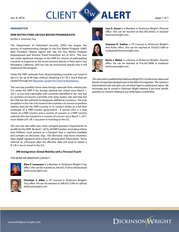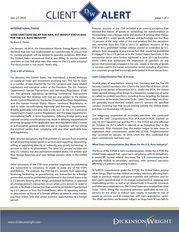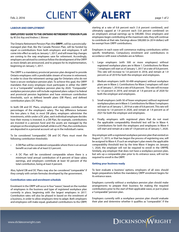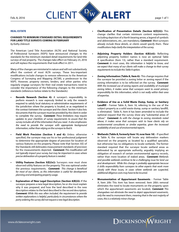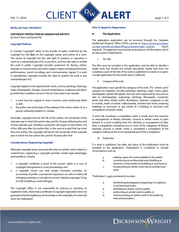SCOTUS: Statistical or Representative Evidence Can Be Used In Class and Collective Actions - March 28, 2016
Dickinson Wright
Description
March 28, 2016
CLIENT
of representative or statistical proof. In its Tyson decision, the
Supreme Court stated in no uncertain terms that “Wal-Mart does
not stand for the broad proposition that a representative sample is
an impermissible means of establishing classwide liability,” reasoning
instead that unlike in Wal-Mart, the plaintiffs in Tyson could have relied
on the representative evidence to establish liability and damages on
an individual basis.
The Supreme Court’s analysis on the issue of representative proof
raises an interesting point about Tyson’s litigation strategy. That Tyson
did not challenge the methodology of the employees’ expert witness
who calculated the average donning and doffing times proved
significant. Tyson’s silence, combined with their lack of time records
relating to how long it took each employee to don and doff their
equipment, left them in the difficult position of fighting something
(i.e., the plaintiffs’ expert’s report) with nothing.
By not challenging the admissibility of the report, the court seemed to indicate its hands were tied as to whether the report should have been considered by the jury. It is distinctly possible this decision comes out differently (or is at least a closer question), if plaintiffs’ methodology was challenged on the merits. The major takeaway is companies seeking to discredit representative or statistical proof need to show such proof does not satisfy the Rules of Evidence and should not be considered. The court was clear in saying that just because statistical methods were used in this case does not mean they will be appropriate in all circumstances: “The fairness and utility of statistical methods in contexts other than those presented here will depend on facts and circumstances particular to those cases.” Thus, going forward, companies defending themselves against class and collective actions need to be prepared to challenge the methodology of the representative proof put forward by plaintiffs at summary judgment.
The use of representative and statistical proof remains viable, meaning class and collective actions are alive and well. Businesses must proceed accordingly. This client alert is published by Dickinson Wright PLLC to inform our clients and friends of important developments in the field of Litigation, Class Action, Labor & Employment, and/or Product Liability & Personal Injury law. The content is informational only and does not constitute legal or professional advice. We encourage you to consult a Dickinson Wright attorney if you have specific questions or concerns relating to any of the topics covered in here. FOR MORE INFORMATION CONTACT: Joshua L.
Burgener is an Associate in Dickinson Wright’s Nashville office. He can be reached at 615.620.1757 or jburgener@dickinsonwright.com. Joseph K. McKinney is an Associate in Dickinson Wright’s Nashville office.
He can be reached at 615.620.1744 or jmckinney@dickinsonwright.com. ALERT page 2 of 2 .
By not challenging the admissibility of the report, the court seemed to indicate its hands were tied as to whether the report should have been considered by the jury. It is distinctly possible this decision comes out differently (or is at least a closer question), if plaintiffs’ methodology was challenged on the merits. The major takeaway is companies seeking to discredit representative or statistical proof need to show such proof does not satisfy the Rules of Evidence and should not be considered. The court was clear in saying that just because statistical methods were used in this case does not mean they will be appropriate in all circumstances: “The fairness and utility of statistical methods in contexts other than those presented here will depend on facts and circumstances particular to those cases.” Thus, going forward, companies defending themselves against class and collective actions need to be prepared to challenge the methodology of the representative proof put forward by plaintiffs at summary judgment.
The use of representative and statistical proof remains viable, meaning class and collective actions are alive and well. Businesses must proceed accordingly. This client alert is published by Dickinson Wright PLLC to inform our clients and friends of important developments in the field of Litigation, Class Action, Labor & Employment, and/or Product Liability & Personal Injury law. The content is informational only and does not constitute legal or professional advice. We encourage you to consult a Dickinson Wright attorney if you have specific questions or concerns relating to any of the topics covered in here. FOR MORE INFORMATION CONTACT: Joshua L.
Burgener is an Associate in Dickinson Wright’s Nashville office. He can be reached at 615.620.1757 or jburgener@dickinsonwright.com. Joseph K. McKinney is an Associate in Dickinson Wright’s Nashville office.
He can be reached at 615.620.1744 or jmckinney@dickinsonwright.com. ALERT page 2 of 2 .
Regulations Presentations
+
Regulations Sub Categories


